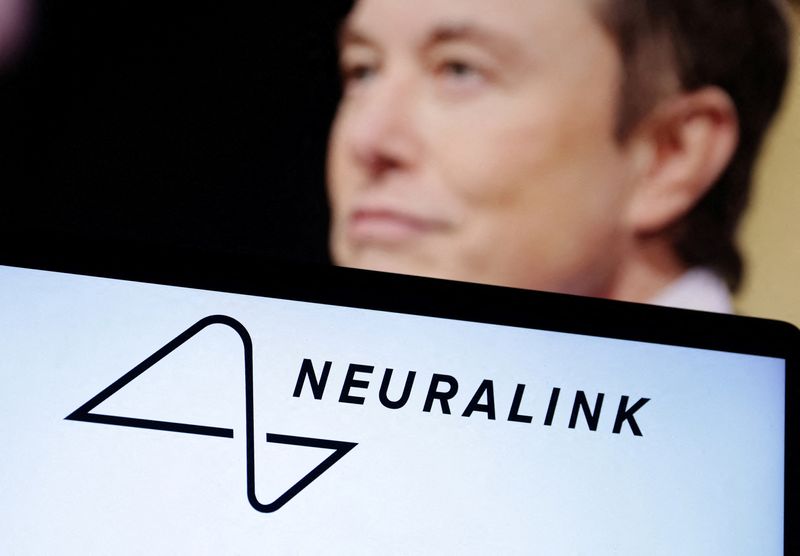By Rachael Levy, Krystal Hu and Marisa Taylor
(Reuters) - Elon Musk's brain implant startup Neuralink, which was valued at close to $2 billion in a private fundraising round two years ago, is now worth around $5 billion based on privately executed stock trades described to Reuters by five sources with knowledge of the matter.
Some purchases by bullish investors boosted the valuation in recent months, ahead of Neuralink's May 25 announcement that U.S. regulators had approved a human trial on its brain chip, the sources said.
Experts have said it could take several years for Neuralink to secure commercial use clearance. Kip Ludwig, former program director for neural engineering at the U.S. National Institutes of Health (NIH), said he "optimistically" expected Neuralink to take at least 10 more years to commercialize its brain implant. The company also faces other challenges that include federal probes into its handling of animal research.
Following the trial's approval, however, Neuralink shares were marketed privately to investors in recent days at a $7 billion valuation, equivalent to $55 per share, according to an email seen by Reuters. Reuters could not establish whether the seller found buyers for that price. The email cited the U.S. Food and Drug Administration's (FDA) approval of the clinical trial as grounds for the deal being "sweeter."
Neuralink executives and Musk did not respond to requests for comment.
Musk has expressed grand ambitions for Neuralink, saying its chip would allow healthy and disabled people alike to pop into neighborhood facilities for speedy surgical insertions of devices to treat obesity, autism, depression and schizophrenia. He even sees them being used for web-surfing and telepathy. A Neuralink executive recently gave more modest short-term objectives, such as helping paralyzed patients communicate through computerized text without typing.
The stock transactions at a valuation of around $5 billion have been carried out by shareholders such as employees and the company's early backers, rather than Neuralink selling new shares to investors. Such so-called secondary trades are an imperfect gauge of a company's value; their volume is thin and they lack the wider market consensus of a fundraising round or initial public offering (IPO).
Neuralink's valuation jump in secondary trades is in sharp contrast to other startups. About 85% of pre-IPO companies are currently valued in secondary trades at an average discount of 47% to their last funding round, according to data provider Caplight.
In Neuralink's last known fundraising in 2021, it raised $205 million at an approximately $2 billion valuation, according to data provider Pitchbook.
Many of the recent stock sales have been to relatively small investors, who typically focus more on getting a slice of a company owned by Musk than scrutinizing its valuation. The maximum amount sought for the Neuralink shares marketed for sale at a $7 billion valuation was just $500,000, according to the email seen by Reuters.
Sim Desai, chief executive of Hiive, an online platform where the shares are traded, said demand for Neuralink stock has been "tremendous." He pegged the valuation that buyers are willing to pay at around $4.5 billion.
Some biomedical experts are skeptical. Arun Sridhar, a scientist and entrepreneur who specializes in neuromodulation, called Neuralink's valuation "bonkers" based on how early the brain implant is in its clinical development.
"A study to assess safety and tolerability is in no shape or form valid to justify a $5 billion valuation," said Sridhar, who helped launch Galvani Bioelectronics, a developer of implants backed by GSK Plc and Alphabet (NASDAQ:GOOGL) Inc's Verily Life Sciences. Galvani is not a competitor of Neuralink because its implants under development will be installed in an artery to the spleen to help treat rheumatoid arthritis, rather than the brain.
INVESTIGATIONS
The FDA initially rejected Neuralink's request for a human trial last year, citing safety reasons, Reuters has reported. Even after securing approval, the company faces several challenges.
Neuralink has come under scrutiny from U.S. lawmakers after Reuters reported in May that its animal-research board may have violated conflict-of-interest regulations. Neuralink employees who sat on that board, which oversees the welfare of the animals that were being tested, also stood to benefit from the implant's quick development. Neuralink stock that some of the employees hold has jumped around 150% in value in just two years, based on the secondary trades.
The law enforcement arm of the U.S. Department of Agriculture has been investigating Neuralink for potential animal-welfare violations. Neuralink staff told Reuters last year that the company was rushing and botching surgeries on monkeys, pigs and sheep, resulting in far more animal deaths than necessary, as Musk pressured staff to receive FDA approval.
The Department of Transportation is separately probing whether Neuralink illegally transported dangerous pathogens on chips removed from monkey brains without proper containment measures.
Neither Musk nor Neuralink have responded to multiple requests for comment on the probes or the Reuters reports.
